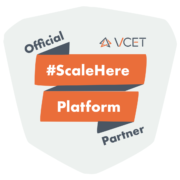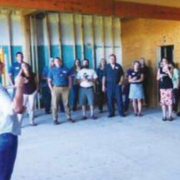Vermont Innovation Hubs Launch Network To Support Rural Entrepreneurs
#ScaleHere Platform Addresses Barriers to Starting and Scaling a Business in Vermont
Burlington, VT (May 23, 2019) – The Vermont Center for Emerging Technologies (VCET) today announced new partnerships with five innovation hubs to boost startups, innovation and localized economic development throughout Vermont. The #ScaleHere platform accelerates business growth throughout the state by sharing the business resources aggregated at VCET to companies at other non-profit innovation centers outside of the greater Burlington area.
“Economic development used to be here or there, but today, it’s here and there,” said David Bradbury, VCET President. “The #ScaleHere platform shares expert advice, business mentoring and deeply discounted technology services to members in these innovation centers that can exceed $100,000 in support per company.”
In addition to VCET’s three innovation hubs in Burlington and Middlebury, the #ScaleHere partners launching today include: Do North Coworking, Lyndonville; The Space on Main, Bradford; The Mint, Rutland; Black River Innovation Campus (BRIC), Springfield; and The Lightning Jar, Bennington.
As part of the #ScaleHere platform, eligible members in these innovation hubs now have free access to a larger network of resources to help them start and grow their businesses. Platform members can connect with more than 130 business mentors, get one-on-one coaching and consulting sessions, and connect to third-party technology and business resources. The #ScaleHere platform also brings valuable financial incentives such as SaaS partner program discounts, up to $100k in cloud credits, and $20k in fee-free payment processing.
“The #ScaleHere platform is another example of how Vermonters are working together to reverse our declining workforce trends,” said Michael Schirling, Vermont Secretary of Commerce. “Our rural communities and city centers coming together to share resources, lower costs, connect with area colleges, and ultimately aid our state’s entrepreneurs will help the companies of tomorrow take root and grow in Vermont.”
Since launching at the University of Vermont, VCET has earned national recognition for its impacts advancing Vermont’s technology ecosystem through strategic curation of people, places and capital, leading to business growth and investments in the local economy. Now, through #ScaleHere, entrepreneurs can thrive more broadly in any part of Vermont, inspiring business growth and innovation throughout the state. The Vermont Technology Council has provided support for this initiative along with VCET’s other key partners such as U.S. Senator Patrick J. Leahy, Middlebury College, The University of Vermont, Consolidated Communications, Champlain College, the Vermont Agency of Commerce and Norwich University.
What #ScaleHere Members Have to Say:
“The Space On Main is stoked! The #ScaleHere partnership with VCET is a game-changer, both in serving current members as well as attracting members who are feeling a lack of entrepreneurial support in East Central Vermont. Nearly all of our applicants have expressed wanting to start or grow businesses, and partnerships like this will help them take the next step.” – Monique Priestley, president and founder, The Space on Main
“VCET has been a valuable asset to our growth by helping to connect us with the right human capital to solve various business development problems. Knowing we have advocates wanting us to succeed helps to lower the stress of being a tech entrepreneur.” – Jason Shafer, PhD, president and CEO of Northview Weather LLC at Do North Coworking
“Holy s$#t, this is awesome.” – Anonymous business owner, The Space on Main
“Having access to the programs available through VCET (Stripe and AWS Startup Discount) has been a huge help in getting Pool Shark H2O running so we can continue to help keep swimming pool water clean and safe for everyone. Many of the programs offering assistance to startup companies are only available, or accessible, in the Burlington area and don’t reach Southern Vermont. The extension of VCET benefits has helped us take advantage of technology we otherwise many not have been able to afford.” – Scott M Trafton, president and co-founder, Pool Shark H2O, The Lightning Jar
“We’re excited about the possibilities that #ScaleHere offers to existing and potential entrepreneurs in our region. Members of The Lightning Jar are already taking advantage of these benefits, reducing the risk to entrepreneurs and increasing their chances of success. At Global-Z we were also able to tap into the #ScaleHere network, which connected us with subject matter experts and quickly allowed us to expand our network. This is a tremendous tool for startups and existing businesses in Vermont looking to grow.” – Dimitri Garder, CEO of Global-Z, and Director of The Lightning Jar
“In our rural communities it can be a challenge for a startup business to find the types of resources offered through #ScaleHere. Member businesses at Do North Coworking are already taking advantage of the technology discounts and access to experts. Industry-specific mentors provide deep insights into the nuances of a sector and, for a startup, this knowledge can be the difference between success and failure.” – Evan Carlson, entrepreneur in residence, Do North Coworking
(Download a PDF of the Press Release)
About VCET
Advancing innovation and entrepreneurship, the non-profit Vermont Center for Emerging Technologies (VCET) provides expert business mentoring, technology professional networking, three coworking and accelerator facilities in Middlebury and Burlington, innovation programs, and early stage venture capital. VCET manages the Vermont Seed Capital Fund, LP, a revolving $5 million venture capital investment fund. VCET was named #11 globally in 2013 by the UBI Index and in 2018 received an IMPACT Award from InBIA. Visit www.vcet.co, follow @VCET and listen to #StartHere podcast. Media Contact: Alison Miley, AVPR alison@avprvt.com




